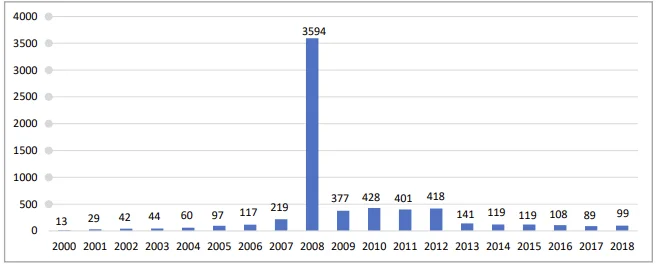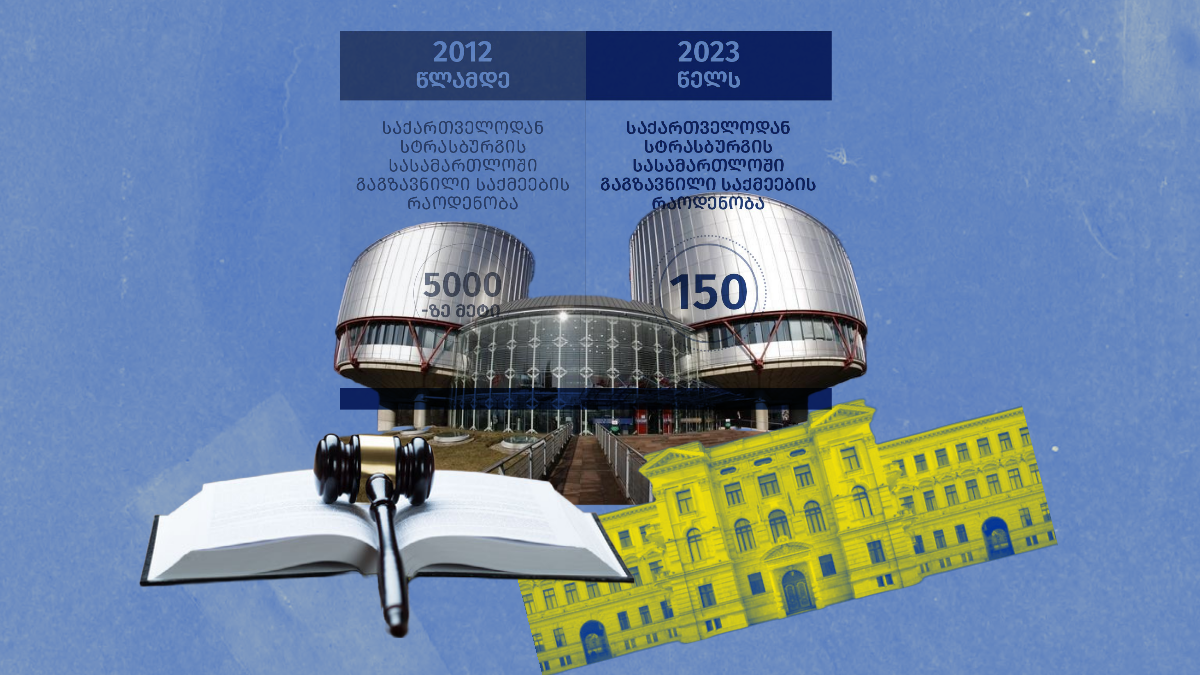Explainer | Why Has the Number of Strasbourg Cases Against Georgia Decreased Since 2012?
What is happening?
Representatives of the ruling party often attribute the decline in the number of Georgian appeals to the European Court of Human Rights (ECHR) after 2012 to the success of the judicial reforms implemented during their tenure.
Is this really the case?
The decrease in Georgia’s applications to the ECHR cannot be attributed solely to the perfect state of the judiciary or an improvement in human rights’ protection. In 2022, GnomonWise published an in-depth study titled ” Dynamics of Cases Litigated Against Georgia in the European Court of Human Rights through the Prism of Court’s Institutional Evolution”. With the help of this research, we will try to explain what caused the decrease in Georgian applications to the Strasbourg Court in recent years.
Which cases go to Strasbourg?
- What does Strasbourg consider? For a case to be considered, the applicant must have exhausted all domestic remedies, which implies going through all available court instances.
- When is it considered? Until 2022, applicants had to apply to the ECHR within six months of a final national decision, but this has been reduced to four months.
- How is it considered? This is the crux of the matter: the increase in the number of appeals each year, due to the simplicity of the initial court filing procedures, led to an overload of cases and long delays in resolving complaints. This necessitated significant reforms to create a filtering mechanism that started functioning between 2009 and 2010.
What changed in 2009-2010?
2009 – Order: In 2009, the order in which cases are considered was changed. If previously, the Court considered cases in chronological order, from 2009 the order is determined by the importance of the case and the need for a prompt decision.
2010 Interlaken Agreement: It recognized the urgency of significant reforms regarding the execution of judgments, the filtering of cases, the role of national courts, and the strengthening of the effectiveness of the ECHR. Its impact was such that the Court distinguishes between the pre-and post-Interlaken periods. The resulting decisions were gradually implemented in the years that followed.
Alternative dispute settlement mechanisms:
- During the Interlaken Conference, much emphasis was placed on alternative dispute resolution methods that don’t involve litigation. Cases resolved in this way aren’t considered by the court and are excluded from general statistics. Two specific mechanisms were introduced:
- Unilateral declaration – where a government acknowledges that it has violated a declaration.
- Amicable settlement – a mutually agreed settlement upon compensation for damages between the claimant and the State.
- Georgia has been using alternative dispute settlement mechanisms since 2012.
2014 – Rules for filing complaints: the rules for filing complaints became more complex, resulting in cases being left unexamined due to violations of the applicable rules. In addition, as of January 1 of that year, applicants were required to file a comprehensive complaint within six months and were prohibited from extending this deadline.
How have these reforms affected Georgia?
As a result of the mentioned reforms, fewer cases are coming to the Court from any country, including Russia, which used to be the most frequently sued country in Strasbourg. However, neither the judicial system nor the human rights situation in Russia has improved.
In Georgia, the post-Interlaken period coincided with a change of government in 2012. Therefore, if we consider 2013 as a statistical watershed for Georgia, the change in the number of appeals to the court has been significantly influenced by the reforms implemented in the European Court.
What do the statistics tell us?
Georgia became a party to the European Court of Human Rights Convention in 1999. The Court made its first decision concerning Georgia in 2004. It was the case “Asanidze vs. Georgia”, which set a precedent for the Convention system itself: for the first time, the Court demanded the immediate release of an unlawfully detained person in the resolution part of the decision.
“This decision further increased the awareness of the court in Georgia and the expectations of the court’s rigid response to violations and at least the executive authority’s obligation to take concrete steps and made the phrase “I’ll go to Strasbourg” very popular – the GnomonWise study says.
Reduction in the number of inadmissible applications
As a result of this publicity and inexperience, ECHR used to receive a large number of applications from Georgia, which contained procedural violations (violation of deadlines, non-exhaustion of domestic remedies, unfounded and incompatible with the Convention) and were therefore inadmissible for consideration.
97% of the inadmissibility decisions – a total of 143 decisions – date from before 2013. As for complaints filed after 2013, there are only 3% (five in total) of inadmissibility decisions.
Politicized complaints by Russia
On August 11, 2008, Georgia filed an inter-State complaint against Russia with the ECHR.
In response, Russia filed some 3,300 individual complaints against Georgia in 2008, which had the character of a well-organized campaign. This tactic was an attempt by Russia to divert attention from its own crimes and further overload the Court.
In 2010 and 2022, the majority of these complaints were excluded from the cases considered by the Court on the grounds of inadmissibility. However, the submission of so many complaints simultaneously had a serious impact on the statistical picture related to Georgia – more than 3,300 complaints, constitute about half of the total complaints submitted by Georgia since the ratification of the European Convention on Human Rights.
Of course, these complaints cannot be used to assess the quality of the Georgian judicial system. The use of these specific complaints in the statistics is a manipulation of the statistics.
Complaints about conditions in penitentiary institutions
The increasing trend in the number of cases filed against Georgia before 2012 was also influenced by disputes related to the conditions in penitentiary institutions. Since there was no effective internal remedy to respond to the violation of rights in the penitentiary institutions, the prisoners could apply directly to the European Court.
However, the ECHR positively assessed the amendments to the Penal Code introduced on October 1, 2010, and the Court decided the complaints review mechanism resulting from these amendments to be an effective domestic mechanism. As a result, the number of appeals by prisoners to the European Court has decreased since 2011.
It should also be noted that 46% of the decisions on the exclusion of pending cases (a total of 237 decisions up to 2022) relate to the conditions in penitentiary institutions.
Overall picture
The graph below shows that the number of cases brought against Georgia in the ECHR peaked in 2008 at the expense of cases brought by Russia. In fact, a downward trend can be observed since 2013, which could be influenced by both the exclusion of prisoners’ complaints and the significant reduction of inadmissible decisions in the period after 2013.
The graph is presented in the GnomonWise research with a note that the Court has not officially published data on filed complaints since 2006, therefore this type of data is not officially available for Georgia after 2006 and is based on the data collected by Nona Tsotsoria, Georgia’s former representative to the Strasbourg Court.

Conclusion
When discussing the statistics on applications to the ECHR, it is important to take into account the wider context, in particular the important role of the ECHR reforms in this process, alongside domestic factors.
We cannot rely on statistics alone to assess the human rights situation. Qualitative measures, such as the lived experiences of individuals and communities, and reports on the human rights situation are more important indicators than statistics.
The GnomonWise study emphasizes that the President of the European Court of Human Rights himself stressed the “need for substantive analysis” as opposed to “playing with numbers”, and that ” the total number of cases considered in a given period was rejected as a measure of the Court’s success, and a new indicator has been defined as how the Court considers the most important cases in terms of priority policy.”
The material was prepared by Nana Tchanturia (Civil.ge)
This post is also available in: ქართული
